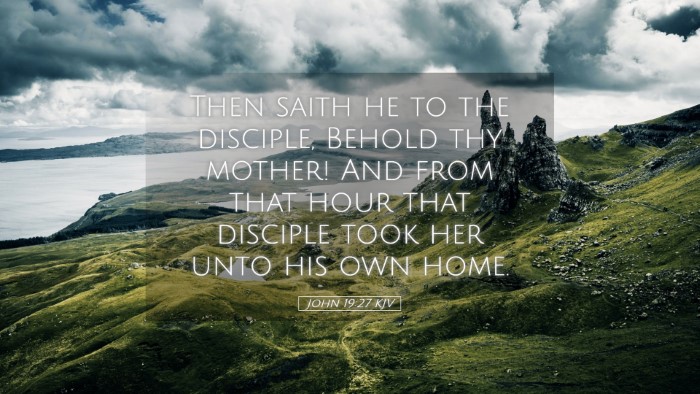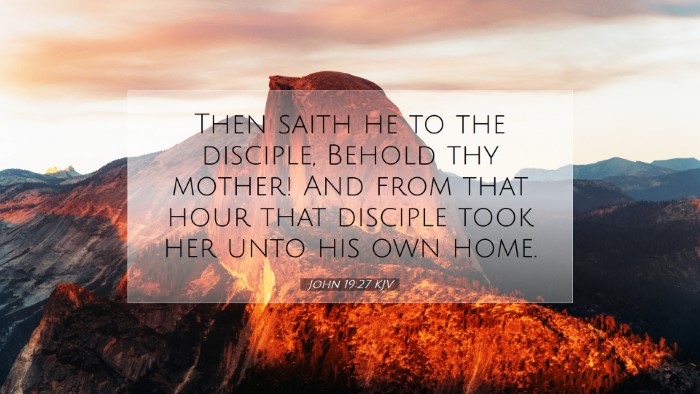John 19:27 Commentary
Verse Reference: John 19:27 - "Then he said to his disciple, 'Behold your mother!' And from that hour that disciple took her to his own home."
Contextual Background
This verse appears in the climax of the crucifixion narrative, where Jesus is surrounded by his accusers and suffers immensely on the cross. Crucifixion was a degrading and painful method of execution employed by the Romans, and it was here in this moment of profound suffering that Jesus demonstrated care for his earthly relationships, particularly concerning his mother, Mary.
Exegetical Insights
-
Jesus' Compassion in Suffering
Even while enduring the agony of crucifixion, Jesus exhibited deep compassion. Matthew Henry emphasizes that, despite his own trials, Jesus was concerned about the life and well-being of his mother. This reveals his humanity and the importance he placed on familial relationships.
-
Significance of the Disciple
In calling John “the disciple whom he loved,” the text highlights the special relationship between Jesus and John. Albert Barnes notes that Jesus entrusted Mary’s care to John, which illustrates the close and trustworthy nature of their bond. This implies that Christian love and responsibility extend beyond blood relations and encompass the broader family of faith.
-
Mary's Role
Mary's presence at the crucifixion speaks volumes about her steadfastness and faith. Adam Clarke suggests she embodies a model of enduring faithfulness. Her sorrow is not only personal but also reflects the broader grief of those who recognize their messiah in suffering. The fact that Mary is mentioned amidst torment illustrates her bravery and loyalty.
-
Discipleship and Care
Jesus' command to John underscores the theme of discipleship, which includes taking on responsibilities for one another. As John took Mary into his home, this act exemplifies the Christian calling to care for each other, especially during times of trial. As per Barnes, this act could signify the transformation of relationships in the kingdom of God, establishing bonds of love and duty that supersede mere biological ties.
Theological Reflections
-
Christ’s Mediation
This exchange between Jesus and John can also be seen as a profound theological statement about Christ’s role as mediator. As Matthew Henry notes, Jesus not only mediates between God and humanity but also within human relationships. He arranges care for Mary, illustrating how Christ’s work impacts various aspects of life.
-
The Redemption of Relationships
Through Jesus’ act, we see a redemptive quality in how relationships are formulated under the lordship of Christ. In a very real sense, Jesus redefines families through faith, as upon believing, individuals are welcomed into a new familial bond. Clarke reminds us that such an interaction encourages believers to see all within the household of faith as family, promoting a spirit of unity and care.
-
The Early Church’s Perspective
The early church held Mary in high regard, and this passage helped establish practices of honor and care for widows and mothers in subsequent communities. As seen in Acts and the epistles, community support was vital, underlining that taking care of one’s family of faith was imperative. Barnes emphasizes that this verse sheds light on the communal responsibilities among Christians which continue today.
Practical Applications
-
Caring for Families
This passage serves as a reminder to modern believers about the importance of family both in spiritual and practical terms. Pastors and Christian leaders can draw from this narrative to encourage congregations to engage in mutual care and support, especially for those who may lack immediate familial support.
-
Encouragement in Suffering
In moments of suffering, as Jesus experienced, believers should witness compassionate care not just received from Christ but also extended to others. This verse calls every disciple to embrace their role in ensuring others are supported through trials, echoing the love demonstrated by Christ.
-
Building Christian Community
The call to take one another into our homes is a practical depiction of discipleship that encourages the building of authentic and lasting relationships within church communities. This verse supports the idea of hospitality as an essential practice in following Christ, fostering environments where believers can support one another in both spiritual growth and everyday life.
Conclusion
John 19:27 offers profound insights into the nature of Jesus' compassion and the redefining of family in light of faith. It calls believers to action in caring for one another and setting an example of steadfastness in the face of trials. This verse encapsulates key themes of love, responsibility, and the transformative power of Christ’s command in our lives, serving as an enduring message for pastors, theologians, and church communities alike.


